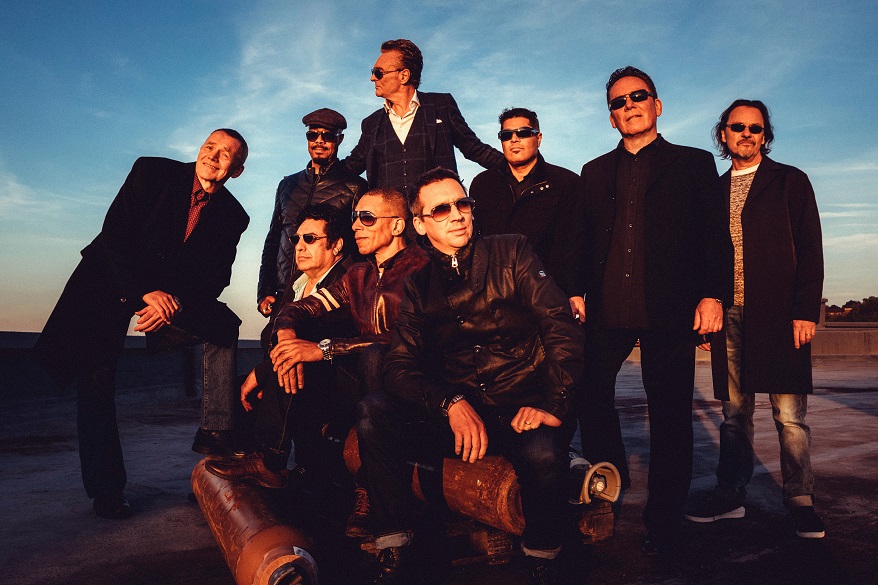Jimmy Brown, Drummer of British reggae band UB40 spoke to us about the new album, the writing process and more.
‘Bigga Baggariddim’ is UB40’s 20th record. It is a collaborative effort with artists spanning four continents including reggae veterans and Zorawar Shukla of Reggae Rajahs as well as artists from Jamaica, New Zealand, and UB40’s home town Birmingham. Through this album, they are revisiting their 1985 album ‘Baggariddim’. The band has reunited with guest artists who appeared on ‘Baggariddim’ as well as collaborated with new and diverse reggae talent who sing and deejay over cuts of the same rhythms to lend their individualistic rootsy musical blend to the brand-new release. The new material features contributions from founding members Robin Campbell (co-vocals/Guitar), Brian Travers (saxophone/keyboards) (he passed away on 23 August after a long battle with cancer), Jimmy Brown (drums), Earl Falconer (bass/keyboards/vocals) and Norman Hassan (percussion/vocals), alongside longtime members Duncan Campbell (vocals), Martin Meredith (saxophone), Laurence Parry (trumpet) and Tony Mullings (keyboards) as well as guest appearances from House of Shem, TippaIrie, BLVK H3RO, Inner Circle, Pablo Rider, KIOKO, Gilly G, Slinger, Winston Francis, Leno Banton and more.
Excerpts:
Q. The new album ‘Bigga Baggariddim’ has collaborations with artists from four continents. How did it happen?
A. When we released our last album, ‘For the Many’, the plan was to release two more albums as part of a package. There would be an instrumental-dub version, and thirdly a collaboration album using the same backing tracks but inviting friends to do whatever they wanted on the backing tracks. ‘Bigga Baggariddim’ is the result. When the Covid-19 pandemic came along and we were all locked down for most of the year, it presented an opportunity for us to get it finished because all the bands and artists involved were no longer touring. So everything was set for us to actually get the record done. And sending it all digitally over the internet makes the whole process so easy.
Q. The artists made their own songs with vocals and production while UB40 provided them with instrumental backing tracks. What led you to take this decision? What was your reaction when you got the songs back from them?
A. We had ultimate control over the production. We sent all the artists two or three backing tracks and told them to chose one. Some of them sent back one track, others did all three. We liked the results so much we used just about everything sent back to us.
Q. How do you think Birmingham has influenced the sound of the band, especially in its formative years?
A. Yes, the band wouldn’t exist without Birmingham. The ethnic make-up of the band reflects the city’s diversity. And the music reflects our life growing up in the inner-city, which, when we were growing up was a diverse melting pot. We were school friends and shared a love of reggae music. That was the music that was around us at the time. All the local youth clubs and dances would have a sound system playing the latest cuts from Jamaica, and there were lots of what they called blues dances or ‘shabeen’s’, house party’s that were mostly illegal because they charged on the door and sold food and drink. This was the culture that influenced us growing up in the 1970s.
Q. How does your band go about writing music? Do you write together or separately?
A. The process of writing is fairly open. There are no rules as such. Sometimes we work from a backing track. Or somebody might bring some words and a melody to the table. Or someone might have an idea for a verse or a chorus and we’ll work on it together. It’s a bit like a football team. Some players might find themselves in different parts of the pitch but the team keeps its shape. It’s the same with us. We always credit UB40 as songwriters, not individuals because it takes the whole band to bring a song to completion.
Q. How did Duncan Campbell influence the overall music-making process? In which direction would the band be heading now?
A. Dunc fitted in really well. He knew how we worked, he was one of the gang already (Dunc and I were in the same class at school), and his contribution to our album ‘For the Many’ was really welcome. The songs he personally
Q. What have been some of your favourite shows and venues over the years and why?
A. Having such a long career means that there have been lots of highs. Having our first hit record was obviously a special moment. Also, playing a sold-out show at Madison Square Gardens with a single and album at number one on the US charts was quite special. Also, playing in South Africa after Mandela was released and the cultural boycott was dropped was an unforgettable experience. I think we hold the record for the largest crowd for a live gig in the country’s history. That was a proud moment. Touring the Polynesian islands was something special too, like touring in paradise. There are so many of those moments over our 40-year career.
Q. With the ongoing pandemic and restrictions that come with it, do you miss performing on stage?
A. I didn’t realise how much I would miss performing. At first, the lockdown was no problem. It was great to spend some uninterrupted time with my family. But as we went into the second year of lockdown I think we all started to get itchy feet. Performing is what we do. In 2019, we did well over 100 shows and then suddenly there was nothing. We all miss the buzz of live shows. Not just the performance but the atmosphere of a live venue, and being with your best mates, and the banter with the crew. I miss the excitement.

